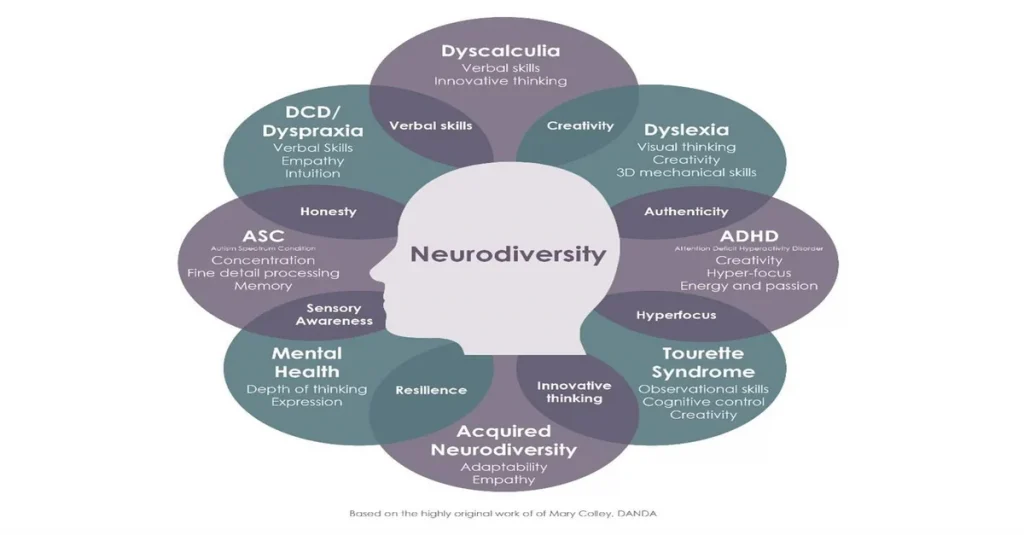Neurodiversity is a term use to describe the neurological differences that exist between individuals, including those relate to Autism Spectrum Disorder (ASD), Attention Deficit Hyperactivity Disorder (ADHD), Dyslexia and other conditions. Important Neurodiversity is an concept for organizations to understand, as it can help create an inclusive working environment where everyone’s unique skills and attributes can be recognize and value. Neurodiversity at work is about recognizing, understanding and celebrating the diversity of brains in a workplace.
Table of Contents
Neurodiversity is a term use to describe the neurological differences that exist between individuals, including those relate to Autism Spectrum Disorder (ASD), Attention Deficit Hyperactivity Disorder (ADHD), Dyslexia and other conditions. Important Neurodiversity is an concept for organizations to understand, as it can help create an inclusive working environment where everyone’s unique skills and attributes can be recognize and value. Neurodiversity at work is about recognizing, understanding and celebrating the diversity of brains in a workplace.
Neurodiversity speaker are professionals who can help organizations understand Neurodiversity and how it affects their workforce. Share Neurodiversity speakers their knowledge, experience and expertise to help organizations create
Role of Neurodiversity Speaker
- The role of Neurodiversity Speakers is to:
- Provide an understanding of Neurodiversity and its impact in the workplace.
- Explain Neurodiversity friendly policies and practices.
- Support organizations to create Neurodiversity-equipped teams.
- Help with developing Neurodiversity sensitive recruitment processes.
- Promote Neurodiversity awareness and acceptance within organizations.
- Identify Neurodiversity people in the workplace and recognize their unique skills and attributes.
- Provide training for Neurodiversity-friendly workplaces.
- Guide employers to create Neurodiversity friendly environments.
How To Support Neurodivergent Employees in The Workplace?
Organizations must recognize Neurodiversity as an asset to their organization and ensure they are providing Neurodivergent employees with the support they need. Some Neurodivergent individuals may require adjustments in order to perform at their optimal level, including access to Neurodiversity coaching, specialist equipment or workplace modifications.
Employers can also create Neurodiversity-friendly policies and practices to ensure Neurodivergent individuals are support in their roles. These could include providing flexible working arrangements, such as allowing Neurodivergent employees to work from home or have flexible hours. Employers can also create Neurodiversity training programmer for staff members and offer Neurodiversity awareness workshops to increase understanding and acceptance of Neurodiversity individuals.
Ultimately, Neurodiversity should be recognize as a strength and celebrate in the workplace. Neurodivergent employees are valuable assets to any organization and supporting them will help create an inclusive, diverse and strong workforce.
What Are Some Examples of Neurodiversity?
Autism Spectrum Disorder (ASD)
This is a neurological disorder that affects communication and behavior, and is characterize by difficulties with social interaction, repetitive behaviors and sensory sensitivity.
Attention Deficit Hyperactivity Disorder (ADHD)
This is a mental health condition that affects concentration, impulsivity and hyperactivity levels. It can affect people of all ages, genders, and walks of life.
Dyslexia
This is a learning disorder that affects the way people process language, which can lead to difficulties with reading, writing and spelling.
Dyspraxia
Also known as Developmental Coordination Disorder (DCD), this is a neurological disorder that affects motor skills and coordination. It can interfere with activities such as handwriting, tying shoelaces, or riding a bike.
Tourette Syndrome
This is a Neurodevelopmental disorder characterize by involuntary movements and vocalizations known as tics. Tics can be verbal (uttering words) or physical (making movements).
Dyscalculia
This is a Neurodevelopmental disorder that affects the ability to understand, learn and use mathematics. It can interfere with calculations, counting and problem solving.
Visual Processing Disorder (VPD)
This is a Neurodevelopmental disorder that affects how information from the eyes is interpret by the brain. It can lead to difficulties in tasks such as reading, handwriting and understanding visual patterns.
Learning Disabilities
A learning disability is a Neurodevelopmental disorder that affects the way people learn and process information. It can interfere with communication, problem solving, memory and daily life activities.
Intellectual Disability
Also known as Mental Retardation, this is a Neurodevelopmental disorder that affects intellectual functioning and adaptive behavior skills. It can lead to difficulty with problem solving, understanding language and reasoning.
Central Auditory Processing Disorder (CAPD)
This is a Neurodevelopmental disorder that affects the way sound is interpret by the brain. It can lead to difficulty understanding speech, especially in noisy environments.
Neurodiverse Language Disorder (NLD)
This is a Neurodevelopmental disorder that affects communication and language skills. It can interfere with the ability to understand and use language effectively.
By understanding Neurodiversity and its many forms, we can create an inclusive workplace for Neurodivergent individuals and ensure they are support in their roles. Neurodiversity Speakers can be a great resource to help organizations gain an understanding and appreciation of Neurodiversity and how it can benefit the workplace.
Conclusion
Neurodiversity is an often misunderstood and overlook concept, but it is vital for creating a strong and inclusive workplace. By understanding Neurodiversity and its many forms, we can ensure that Neurodivergent individuals are properly support in their roles, enabling them to reach their full potential. Neurodiversity Speakers are a great resource for organizations wanting to gain a better understanding of Neurodiversity and its benefits. By embracing Neurodiversity, organizations can create a strong and diverse workforce that will lead to positive business outcomes.





More Stories
Suede Fringe Jacket Perfect for California and Texas Style
Perry Gargano Crush Ear Cuff & Tentacle Corkscrew: Complete Review
What Makes Cowboy Pants in California and Texas So Different? A Complete Style Guide